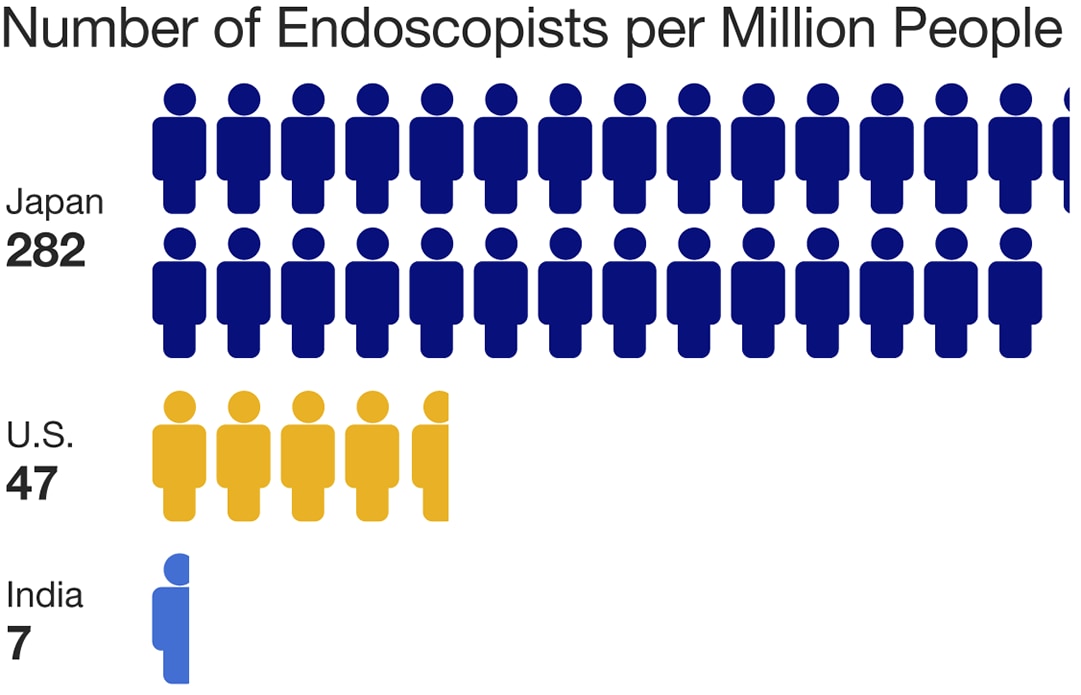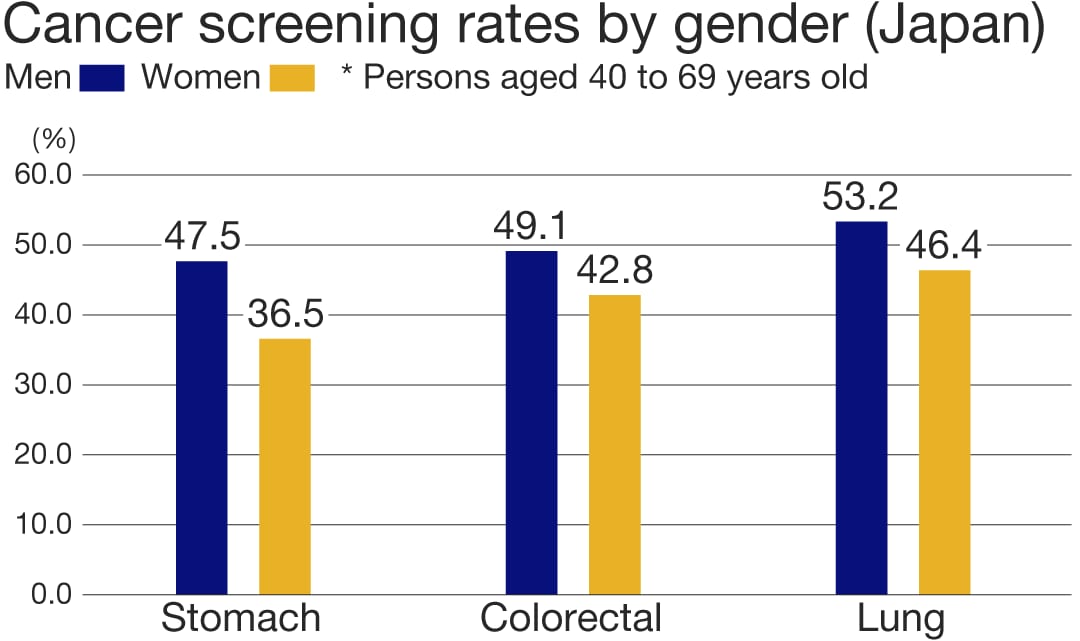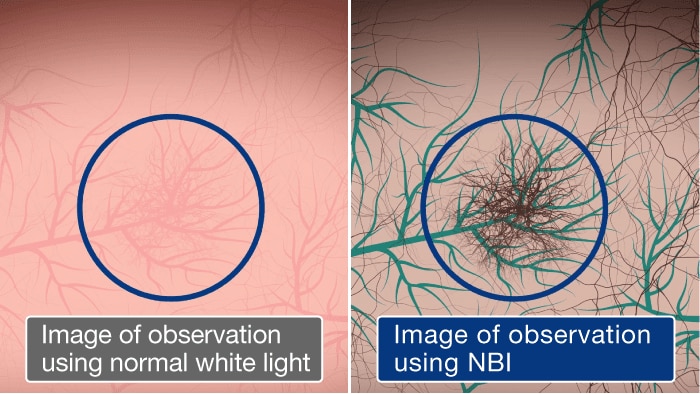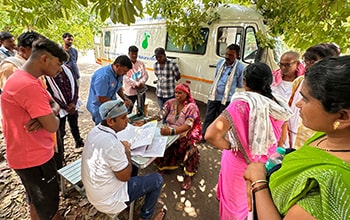| Top Priority |
|
|---|---|
| High Priority |
|
| Others |
|
Focus Area 1Healthcare Access and Outcome
The Future That We Envision
Creating a world where all people can enjoy
the benefits of endoscopy.
The number of cancer patients is trending upward worldwide. However, if patients can receive appropriate screening, diagnosis and treatment early, the chances of curing cancer increase.
The Olympus Group places the highest priority on patient safety, and we develop and provide endoscopes and related treatment devices (endoscopic equipment) that contribute to the early detection, diagnosis, and minimally invasive treatment of cancer. In addition, training healthcare professionals on the safe use of endoscopic equipment is essential for medical institutions to use endoscopic equipment for the diagnosis and treatment of patients. Accordingly, we provide training programs for healthcare professionals on endoscopic equipment use and procedures as well as maintenance methods, supporting the development of systems for the safe use of endoscopic equipment.
In addition, we work with medical associations and local governments to actively implement educational activities that convey the importance of early detection in cancer treatment with the objective of creating a world where all people can enjoy the benefits of endoscopy.
- Materiality Topics
WhyWhy are we taking these actions?
Contributing to early detection and treatment of cancer
Olympus Perspective 1: Number of Cancer Patients
The number of cancer patients is trending upward worldwide
The number of cancer patients has been increasing globally in recent years. The compound annual growth rate (CAGR) of increase of the number of colorectal and gastric cancer cases is forecast to be 1.7% through 2040.

* EU5: UK, France, Italy, Germany, Spain Source: Epi Database, Cerner Enviza. Accessed July 2023
(Reference data) Integrated Report 2023 Page 42-45 https://www.olympus-global.com/ir/data/integratedreport/pdf/integrated_report_2023e_A4.pdf?231114a.pdf
Olympus Perspective 2: Medical Care Provision Environments
Disparities in medical care systems and levels among countries and regions

The number of endoscopists per million people is 282 in Japan, but only 7 in India.1 Survival rates of cancer patients are lower in India than in developed countries. The five-year survival rate for colorectal cancer patients is about 70%2 in Japan, but is only about 30%3 in India.
In this way, there are large disparities in medical care systems and the standard of care among countries and regions.
1Compiled by Olympus using publicly available data
2National Cancer Center Japan, Cancer Information Service, Aggregation of Hospital-based Cancer Registry Survival Rates https://ganjoho.jp/public/qa_links/report/hosp_c/hosp_c_reg_surv/index.html (in Japanese, accessed March 16, 2023)
3World Health Organization. (n.d.). GCO-SURVCAN. Retrieved from International Agency for Research on Cancer: https://gco.iarc.fr/survival/survcan/dataviz/table?survival=5&populations=0&cancers=90
Olympus Perspective 3: Public Awareness
Raising awareness of the importance of early detection and treatment

The more cancer progresses, the fewer the available treatment options, and post-treatment survival rates also tend to decline. As a result, early detection and treatment of cancer are considered to be crucial, and various countries and regions are encouraging cancer screening.
In Japan, the Ministry of Health, Labour and Welfare has set a cancer screening rate target of 60%. According to the Comprehensive Survey of Living Conditions conducted in 2022, however, the cancer screening rates for men aged 40 to 69 years are 47.5% for gastric cancer, 49.1% for colorectal cancer, and 53.2% for lung cancer, all falling short of the target, and the survey results indicate that the rates are even lower for women.*
In light of this situation, we believe that the early detection and treatment of cancer requires the expansion of medical care provision environments, including the implementation of regular screening and checkups, and that gaining the public’s understanding of the importance of early detection and treatment will be crucial.
*2022 Comprehensive Survey of Living Conditions (Ministry of Health, Labour and Welfare)
https://www.mhlw.go.jp/toukei/saikin/hw/k-tyosa/k-tyosa22/index.html (in Japanese)
HowHow will we achieve this?
Addressing issues through collaboration with healthcare professionals, medical associations, and local governments and communities
Approach 1: Human Resource Development
Providing opportunities for endoscopy training to healthcare professionals
The Olympus Group has established 17 endoscope training centers worldwide so that healthcare professionals in countries and regions around the world can use endoscopes with confidence. These training centers are equipped with facilities that resemble actual operating rooms and endoscopy rooms and comprehensively provide specialized and advanced educational programs and training to enhance clinical knowledge and procedures so that healthcare professionals can demonstrate the highest levels of performance and provide safety and care to patients.
We also support the development of systems that enable healthcare professionals to handle endoscopes safely, including the provision of multiple educational and training programs in collaboration with medical associations.
〈Related Materiality Topics〉Contribution to health equity and access
Approach 2: Technological Innovation
Working with medical institutions to develop advanced medical devices and technologies that put patient safety first
The endoscope is a main product of the Olympus Group. Development started in 1949 when a doctor at the University of Tokyo made a request for the development of a camera that could photograph and examine the interior of the patient’s stomach. Doctors and the development team at Olympus cooperated to overcome many challenges and pursued the ideal of creating a camera that (1) presented no danger to the patient, (2) created minimal discomfort, (3) allowed photographing of any part of a stomach in a short amount of time, and (4) delivered crisp images for easier diagnosis. As they raised the level of perfection, the developed camera became widely accepted.
This approach to manufacturing has been handed down to the present day, and Olympus continues to work with endoscopists and listen to their needs to develop technology for endoscopic equipment.
We are currently developing software that uses AI to detect lesion candidates and support diagnoses by doctors, single-use endoscopes, an Intelligent Endoscopy Ecosystem, and more.
〈Related Materiality Topics〉Innovation for better healthcare outcome
Approach 3: Public Awareness
Supporting educational activities concerning cancer screening in collaboration with medical associations and local governments
The Olympus Group collaborates with medical associations and local governments in multiple countries and regions to promote educational activities that convey the importance of early detection and treatment of cancer to the public.
In Japan, we support educational activities on cancer screening in cooperation with local governments. In addition, we support educational programs on cancer screening in collaboration with medical associations and NPOs in countries and regions around the world.
We also use our owned media to explain about cancer and provide information on the importance of screening, testing methods, and other topics.
〈Related Materiality Topics〉Corporate citizenship and philanthropy
WhatWhat specifically will we do?
Initiative Example 1: Development of NBI to contribute to the early detection and treatment of cancer

High-contrast observation of blood vessel patterns that were difficult to see
Areas that appear brown: blood vessels on the mucosal surface; areas that appear blue: Veins in the submucosa
Narrow Band Imaging (NBI) developed by Olympus is a representative example of technological innovation that is contributing to the early detection and treatment of cancer.
The gastrocamera developed by Olympus in 1950 greatly advanced early-stage stomach cancer diagnostics. Through the accumulated research that followed, it was understood that early-stage lesions can be found through slight differences in the color of mucosal surfaces within the digestive tract. We developed technology that reveal lesions by changing the light shined in the digestive tract.
When using normal white light during endoscopic screenings to observe the surface of the stomach and large intestine, it can be difficult to detect extremely diminutive lesions. With NBI, we focus on the fact that numerous blood vessels are often gathered in the vicinity of cancerous lesions and use blue and green wavelengths of light to reveal capillaries on the mucosal surface as well as the veins in the submucosa, making it possible to observe in high contrast blood vessel patterns that are difficult to see under normal light.
We are providing endoscopy systems equipped with this NBI technology to medical institutions in countries and regions around the world, contributing to the early detection of cancer.
Initiative Example 2: Contributing to Improvements in Healthcare Standards in India by Supporting Outreach Gastrointestinal Endoscopic Screenings

India is undergoing rapid economic development and population growth, but there is a shortage of cancer screening and treatment infrastructure and specialized doctors, and it is particularly difficult for residents of rural villages to undergo screenings even when they do not feel well. As a part of the solution to these issues, Olympus is collaborating with hospitals and promoting the Outreach Screening Program, which installs endoscopic screening equipment in a vehicle that travels to small villages.

